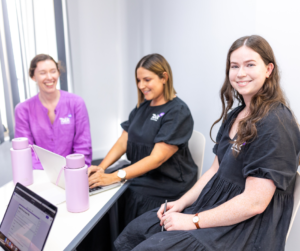As a new graduate speech pathologist, stepping into the professional world can be both exciting and overwhelming. To ensure a smooth transition and to set yourself up for success, it’s essential to consider several key factors when applying for your first job. This blog provides essential tips for new graduate speech pathologists, focusing on caseload expectations, support and supervision, and professional development (PD) opportunities.
Caseload Expectations
Understanding Your Caseload
The size and diversity of your caseload can significantly impact your work experience and job satisfaction. When considering a position, inquire about the typical number of clients you will be expected to manage. A manageable caseload allows you to provide quality care to each client without feeling overwhelmed.
Types of Cases
It’s also crucial to understand the types of cases you will encounter. Will you be dealing with specific disorders or a broad range of speech and language issues? Having clarity on this can help you determine if the job aligns with your areas of interest and expertise.
Workload Balance
Ensure there is a balance between your caseload and other job responsibilities. Overburdening yourself can lead to burnout, especially when you are still adapting to your new role. Ask potential employers how they handle caseload management and what systems are in place to support you in maintaining a healthy workload.
Support and Supervision
Mentorship Programs
As a new graduate, having access to experienced mentors can be invaluable. Look for employers that offer formal mentorship programs These programs provide guidance, support, and feedback, helping you to develop your skills and confidence.
Regular Supervision
Supervision is crucial for professional growth. It offers a platform to discuss challenging cases, explore new treatment techniques, and reflect on your practice. Ensure that the employer provides regular supervision with experienced speech pathologists who can offer constructive insights and support.
Team Collaboration
Working in a supportive team environment can enhance your learning and professional development. Inquire about the team dynamics and how collaborative the work culture is. Being part of a cohesive team where knowledge and experiences are shared can significantly boost your professional growth.
Professional Development (PD) Opportunities
Ongoing Training
Professional development is essential for keeping your skills up-to-date and advancing your career. Look for employers who offer regular training sessions, workshops, and seminars. These opportunities allow you to expand your knowledge base and stay current with the latest advancements in speech pathology.
Financial Support for PD
Some employers may offer financial support or reimbursement for attending external PD events, such as conferences and specialized training courses. This support can make a significant difference, especially for new graduates who may have limited financial resources.
Career Advancement
Consider the potential for career advancement within the organisation. Employers who invest in their employees’ professional development often provide clear pathways for career progression. This can include opportunities for specialisation, leadership roles, or advanced clinical positions.
Additional Considerations
Work-Life Balance
Maintaining a healthy work-life balance is crucial for long-term job satisfaction and personal well-being. Inquire about the employer’s policies regarding work hours, flexible scheduling, and leave entitlements. A supportive work environment that values work-life balance can help you avoid burnout and maintain your passion for the profession.
Organisational Culture
The culture of the organisation plays a significant role in your job satisfaction. Seek out employers who foster a positive, inclusive, and supportive work environment. Talk to current employees, if possible, to get a sense of the workplace culture and values.
Location and Commute
Consider the location of the job and the commute involved. A long and stressful commute can negatively impact your overall job satisfaction and work-life balance. Weigh the pros and cons of the job location and how it fits with your personal preferences and lifestyle.
External Resources
For more information on transitioning into the workforce as a new graduate speech pathologist, check out resources from Speech Pathology Australia, which offers valuable guidance and professional support.
Starting your career as a speech pathologist is an exciting journey filled with opportunities for growth and learning. By carefully considering caseload expectations, support and supervision, and PD opportunities, you can make an informed decision that sets you up for success. At TalkHQ, we are dedicated to providing a supportive and enriching environment for new graduates, helping you to thrive both professionally and personally. Check out other blogs on our website.







